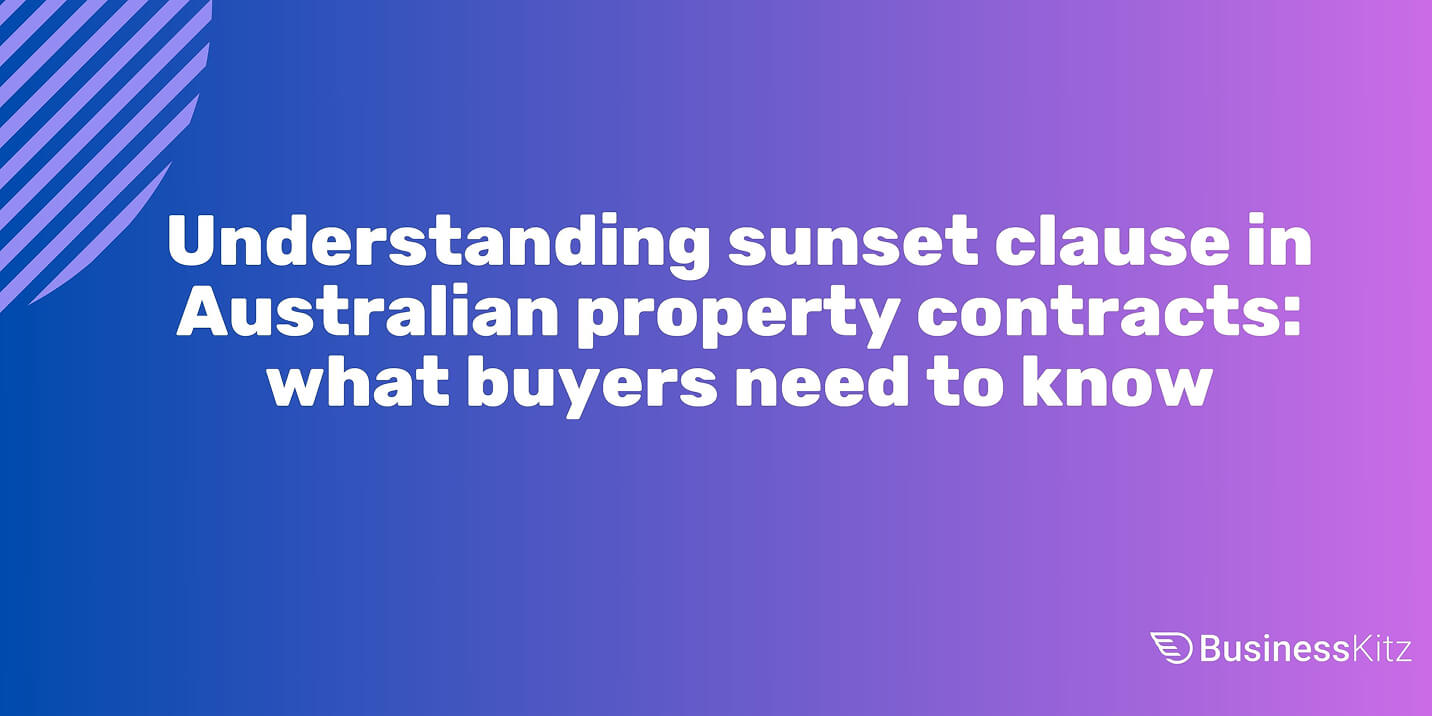
We've helped businesses save $55m with our all-in-one platform. Get instant access to this template and 115+ others, plus AI-powered document creation, starting completely free.
Buying a property off-the-plan can offer substantial benefits, but it also brings legal terms that buyers must understand. One of the most important terms is the sunset clause. This clause sets a clear deadline to complete the deal. The contract may end if the property is not finished by that date. This article explains how sunset clauses work, their risks and how to protect your purchase.
A sunset clause sets a deadline in a property contract. If the project is unfinished or the deal does not proceed by the set date, either party can end the contract without penalty. It gives buyers and sellers a clear timeframe to complete the sale and helps manage delays in off-the-plan property deals.
[ez-toc]

Sunset clauses are standard in off-the-plan contracts where the buyer agrees to purchase a property before it is built, such as an apartment or townhouse. The clause defines a sunset date by which the project must be completed and settlement finalised.
These clauses help avoid long waiting periods. If the property is not completed within the agreed timeframe, the clause can allow a party to terminate the contract and claim their deposit. Some developers may misuse this clause to terminate deals and resell at a higher price.
To address these concerns, several states have introduced new legislation. For example, in NSW, developers must obtain consent from the buyer or seek approval from the Supreme Court before ending a contract under a sunset clause.
A sunset clause affects:
Understanding how a sunset clause works helps everyone involved in the real estate process.
A sunset clause appears in the terms of a contract of sale. It includes a sunset date—the final deadline for the property to be completed and settlement to occur. If the project is not ready by this date, the clause may allow the contract to end without penalty.
Here’s a typical clause:
“If the property is not completed and settlement has not occurred by 1 June 2027, either party may terminate the contract without penalty.”
Clause dateExpected completionSettlement deadlineOutcome if unmet1 June 20251 Dec 20261 June 2027Clause triggers, a contract may end
Some clauses may favour one party more than the other. Constantly assess the terms carefully before signing.
A sunset clause offers protection, but it can also create risk. In some scenarios, developers use delays to their advantage. They may purposely slow the project, then use the clause to cancel the contract and resell the property at a higher price.
Recent legislation now limits these practices. Developers must meet extra conditions in some states before acting on a sunset clause.
✅ Review the sunset date and timeframe
✅ Confirm what happens if the property is not completed
✅ Check if your deposit back is guaranteed
✅ Assess the developer’s project history
✅ Get advice from a conveyancer or solicitor
These steps can help you protect your property purchase and avoid surprises.

A property contract is a legal document. It often includes terms that are unclear or complex. Always seek advice from a solicitor or conveyancer before signing a contract using a sunset clause—especially for off-the-plan purchases.
Getting legal advice ensures you understand the outline of your contract and helps you act on time.

Managing a property contract should be simple. Business Kitz gives you tools to create, sign and store documents in one secure place. The platform works for buyers, sellers, developers and conveyancers.
FeatureBenefitLegally compliant templatesSave time on contract creationDigital signaturesSign documents quickly and securelyCentralised storageStore files in one secure placeScalable workflowsManage more deals efficiently
Yes, but the developer would need to meet certain conditions. In some states, legislation requires the developer to get buyer consent or apply to the court before ending the contract. These changes took effect in recent years to protect buyers from unfair outcomes.
You can try to negotiate a reasonable change before the contract is signed. A solicitor or conveyancer can help you assess the contract and request necessary updates. This gives you more flexibility and better protection.
In some deals, a developer may cancel a contract and sell the property to a new buyer at a higher price. Strong legislation now aims to stop this scenario where the original buyer loses out unfairly.
Yes. Some states have added statutory rules that protect buyers. These rules limit how a sunset clause can be used and outline steps a developer must follow before ending a deal.
If the market drops, the buyer may still need to settle the contract unless a clause allows them to exit. A sunset clause does not protect against a price decrease unless clearly stated in the contract.
An outline of the contract helps you understand your rights and the risks. It shows what to expect if problems arise and lets you act promptly.
A sunset clause helps protect both buyers and sellers—but it also carries risk. You now understand how this clause works, when issues may arise and how to stay protected.
You’ve seen how a sunset clause allows either party to end the deal if work is not finished by the deadline. Sometimes, a developer may misuse this to resell at a higher price. That’s why checking your sale contract and getting legal advice is essential.
With Business Kitz, you can manage documents, sign contracts, and store files in a secure and organised system. Whether handling a single estate deal or working at scale, you’ll stay on track and ready to act.
Copyright © 2025 Business Kitz 14312161